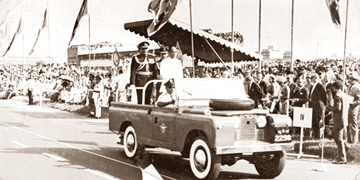The freedom wave that swept the region
Suraj A. BANDARA
|

Independence anniversary celebration in a year gone by. |
Why Britishers were forced to offer
independence for the colonial countries is still controversial. The
offer had been inevitable due to the prevailed world order at that time.
Main reasons could be identified as manifold.
Among them in the Sri Lankan perspective, irrespective of other
external factors, few factors could be highlighted such as:
Modernization and Reform, Colebrooke and Cameron reforms, economic
innovations, rise of the Sri Lankan Middle class, Buddhist Revivalism,
constitutional reforms, world war I, the Donoughmore Commission, growth
of Leftist parties, growth of world war II and transition to
independence to some other countries, the emergence of anti colonial
freedom movement which came up almost in entire world.
These were erupted with the sound liberal education which formed key
ideological platform for the freedom fighters. This new education
combined with philosophical backup unexpectedly embraced the hearts of
the colonial people.
The Britishers, with an eye to create a local loyal academician for a
convenient administrative purposes, introduced this liberal policies in
the local education.
The theoretical manifestations of these new liberal education turned
other way round and accelerated anti-colonial movements demanding our
own administrative mechanism. Local leaders in almost all colonies
vehemently requested from the Britishers a self administrative country
for their territories instead of a alien power in those soil.
By the nineteenth century, a new society was emerging which was a
product of East and West. It was a society with strict rules separating
the rulers from the ruled, and most social association between the
British and Sri Lankans was barred.
The British community was largely a macro economic, English society
with all its class divisions. At the top of the social pyramid were the
British officials of the Ceylon Civil Service.
Elaborate social conventions regulated the conduct of the service’s
members and served to distinguish them as an exclusive caste. This
situation, however, changed slowly in the latter part of the nineteenth
century and quite rapidly in the next century.
In Sri Lanka as in India, the British created an educated class to
provide administrative and professional services in the colony. By the
late nineteenth century, most members of this emerging class were
associated directly or indirectly with the government.
Increased Sri Lankan participation in government affairs demanded the
creation of a legal profession; the need for state health services
required a corps of medical professionals; and the spread of education
provided an impetus to develop the teaching profession.
In addition, the expansion of commercial plantations created a new
class on the basis of their trades and occupations: landowners,
planters, transport agents, contractors, and businessmen. Certain
Sinhalese caste groups, such as the fishermen (Karava) and cinnamon
peelers (Salagama), benefited from the emerging new economic order, to
the detriment of the traditional ruling cultivators (Goyigama).
The development of a capitalist economy forced the traditional elite-
the chiefs and headmen among the low-country Sinhalese and the Kandyan
aristocracy to compete with new groups for the favours of the British.
These upwardly mobile, primarily urban, professionals formed a new
class that transcended divisions of race and caste.
This class, particularly its uppermost strata, was steeped in Western
culture and ideology.
This anglicized elite generally had conservative political leanings,
was loyal to the government, and resembled the British so much in
outlook and social customs that its members were sometimes called brown
sahibs.
At the apex of this new class was a handful of Sri Lankans who had
been able to join the exclusive ranks of the civil service in the
nineteenth century.
After having this westernized liberal education combined with certain
Marxist and leftist theories enhanced the self governing attitude among
the educated Ceylonese and learned the latest methods in freedom
fighting movements.
It had been an expensive task for the Britishers to regulate a
country far East with a decaying navel power. The world wars certainly
compelled them to give up their hands in distant regions like Sri Lanka.
Britishers spent lot of money for the wars and it was hard to find
money since many other powers had emerged challenging the British
supremacy.
In parallel to all these changes African And Asian Leaders had stared
their freedom movement with many sacrifices. They also came up with
armed struggle and had done irreparable loses for the British loyal
segments.
With the new economic liberalism many nations have dominated both
navel and trade power in the world. Therefore, Britishers though they
wanted to keep going with this colonial countries had to hand over the
administration for the local leadership.
India, in this regard played a commendable role and their pressure
was severe which was hardly controlled.
Simultaneously, Sri Lankan Leaders also vigorously demanded a
self-rule and had shared the experiences with the Indian freedom
fighters. Ultimately, Britishers had to offer independence for Sri Lanka
as well due to a combination of many factors. |

